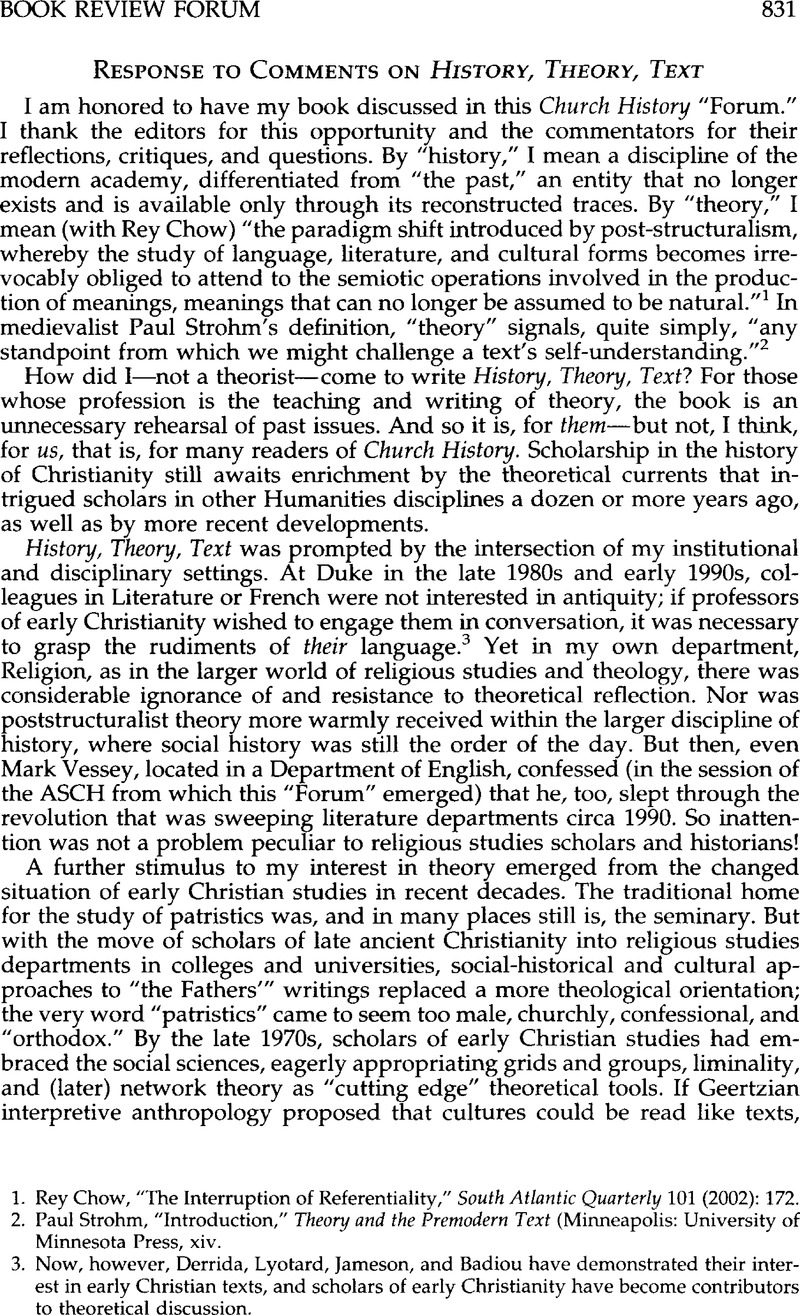No CrossRef data available.
Article contents
Response to Comments on History, Theory, Text
Published online by Cambridge University Press: 28 July 2009
Abstract

- Type
- Book Review Forum
- Information
- Copyright
- Copyright © American Society of Church History 2005
References
1. Chow, Rey, “The Interruption of Referentiality,” South Atlantic Quarterly 101 (2002): 172.CrossRefGoogle Scholar
2. Strohm, Paul, “Introduction,” Theory and the Premodern Text (Minneapolis: University of Minnesota Press, xiv.Google Scholar
3. Now, however, Derrida, Lyotard, Jameson, and Badiou have demonstrated their interest in early Christian texts, and scholars of early Christianity have become contributors to theoretical discussion.
4. As Derrida asks, what is it? “A citation? the beginning of a novel? a proverb? someone else's secretarial archives? an exercise in learning language? the narration of a dream? an alibi? a cryptic code?” and so on (Derrida, Jacques, “Limited Inc a b c,” in Derrida, Limited Inc (Evanston, Ill.: Northwestern University Press, 1988), 163.Google Scholar
5. Foucault, Michel, The Archaeology of Knowledge, trans. Sheridan Smith, A. M. (New York: Pantheon Books, 1972 [1969]), 6–7, 138.Google Scholar
6. Foucault dramatized his point (and scandalized historians) by suggesting that historians look at texts as historical objects in the same way that they might look at tree trunks (Foucault, Michel in France-Culture, 07 10, 1969).Google Scholar
7. Wallach Scott, Joan, “A Statistical Representation of Work: La Statistique de l'industrie à Paris, 1847–1848,” in Scott, Gender and the Politics of History (New York: Columbia University Press, 1988), 113–38, (notes) 217–21Google Scholar. As an alternative to a positivistic use of statistics by historians, Scott urges an approach that “situates any document in its discursive context and reads it not as a reflection of some external reality but as an integral part of that reality, as a contribution to the definition or elaboration of meaning, to the creation of social relationships, economic institutions, and political structures. Such an approach demands that the historian question the terms in which any document presents itself and thus ask how it contributes to constructing the ‘reality’ of the past” (137–38).
8. The essays and books by the commentators of this “Forum” provide some excellent examples of how these approaches can be combined, as does Patricia Cox Miller's forthcoming book, Signifying the Holy: The Corporeal Imagination in Late Antiquity.
9. Jacobs, Andrew S., Remains of the Jews: The Holy Land and Christian Empire in Late Antiquity, Divinations: Rereading Late Ancient Religion (Stanford, Calif.: Stanford University Press, 2004.Google Scholar
10. See discussion in History, Theory, Text, 62–65.
11. Klingshirn, William F., Caesarius of Arles:The Making of a Christian Community in Late Antique Gaul, Cambridge Studies in Medieval Life and Thought (Cambridge: Cambridge University Press, 1994).CrossRefGoogle Scholar
12. Krueger, Derek, Writing and Holiness: The Practice of Authorship in the Early Christian East, Divinations: Re-reading Late Ancient Religion (Philadelphia: University of Pennsylvania Press, 2004).CrossRefGoogle Scholar
13. Stedman Jones, Gareth, “From Historical Sociology to Theoretic History,” British Journal of Sociology 27 (1976): 296.Google Scholar
14. See discussion of ancient historian Moses Finley's argument in History, Theory, Text, 166, 168–69.
15. Similar political concerns fueled the attack of humanistically inspired British Marxist historians on French poststructuralist (also Leftist) historians as elitists, as I detail in History, Theory, Text (79–85).
16. See discussion in History, Theory, Text, 126–29.




